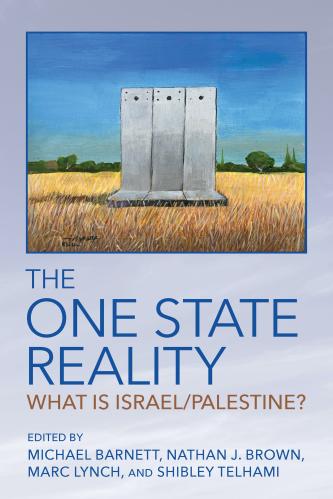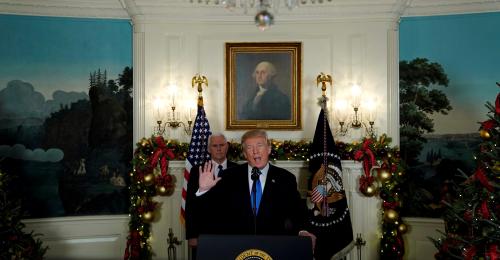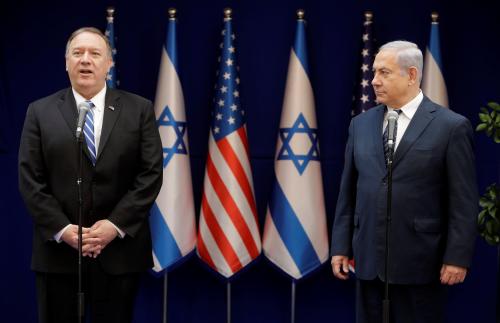The Trump administration’s decision in late November to allow the Palestine Liberation Organization (PLO) mission in Washington to remain open, despite a law that demands its closure, has led many to conclude that the latest drama on the Israel-Palestine front has been resolved. But that’s false, argue Khaled Elgindy and Lara Friedman. The status of the mission is even more precarious than before. This piece originally appeared on LobeLog.
The Trump administration’s recent decision to allow the Palestine Liberation Organization (PLO) mission in Washington—the de facto embassy of the Palestinians—to remain open, despite a law that demands its closure, has led many to conclude that the latest drama on the Israel-Palestine front has been resolved. This is false. The crisis was not defused but merely delayed, with new conditions imposed by the Trump administration that make the status of the mission even more precarious than before.
Moreover, this crisis points to an increasingly unavoidable conclusion: where in the past U.S. laws and policies were designed to keep the Palestinians out of any peace process, based on the view that Palestinian participation was anathema to Israel, today that logic has largely been reversed. American policy now seems to be aimed at locking the Palestinians in a peace process, more or less indefinitely, that severely limits the Palestinians’ diplomatic options and independent decision-making. In both cases, the overriding objective has not been conflict resolution but shielding Israel from pressure.
As has been covered already in numerous articles, the crisis over the PLO office is grounded in one of the many anti-PLO policies put in place by the United States following the 1967 war. What has received less attention is the fact that most of these measures came about not in response to major acts of terrorism but to political and diplomatic initiatives by the PLO. Indeed, virtually all were aimed at preventing the Palestinians from gaining international legitimacy or being permitted to participate in any Middle East peace process.
The first came in September 1975, when Secretary of State Henry Kissinger signed a secret memorandum of agreement (MOA) with Israel, pledging that the United States would not “recognize or negotiate with” the PLO until it recognized Israel’s right to exist and accepted U.N. Security Council Resolutions 242 and 338. Kissinger’s pledge, made less than a year after the United Nations recognized the PLO as the legitimate representative of the Palestinian people, included no mention of terrorism, despite the PLO having been linked to high-profile terror attacks in years prior.
It was not until August 1985, when the MOA was codified into law, that Congress added a third condition requiring the PLO to “renounce the use of terrorism.” Here, again, the new law was not in response to a spike in PLO terror, but to the Reagan administration’s willingness to consider an indirect role for the PLO in a new peace process.
In 1987, shortly after the outbreak of the first intifada, or uprising, Congress passed a new law for the first time defining the PLO as a terrorist organization and, in a provision President Reagan deemed unconstitutional, barring it from virtually any presence or operations in the United States. The PLO met the U.S. conditions for engagement in December 1988, allowing the Reagan administration to launch an official dialogue with the PLO, prompting Congress to place new restrictions on U.S.-PLO contacts.
Following the 1993 signing of the Oslo “declaration of principles” between Israel and the PLO—a diplomatic breakthrough in which the United States was not involved—American lawmakers shifted their focus: not to supporting the peace process, but to circumscribing Palestinian actions and options in the diplomatic and political arenas. Instead of rescinding the existing corpus of anti-PLO legislation, Congress granted presidents authority to temporarily suspend or waive specific provisions, only as necessary for the peace process to continue and subject to congressional oversight. At the same time, Congress passed new laws restricting Palestinian diplomatic activities outside the confines of the U.S.-led peace process. Efforts by the PLO to join or upgrade its status in international bodies became a red line in Congress, starting with a 1994 law requiring the de-funding of UN agencies, and potentially the U.N. as a whole, for admitting Palestine as a full member.
Congress doubled down on this red line in 2011. After Palestine was admitted to UNESCO, forcing the Obama administration to cut off all UNESCO funding, Congress passed a new law conditioning the president’s waiver of the 1987 ban on the PLO operating in the United States on his certifying that the Palestinians had not joined any other U.N. agencies. After the Palestinians joined the International Criminal Court (ICC) in 2015, sparking fears that Israeli soldiers and generals could be prosecuted for their treatment of Palestinians, Congress did the same thing. It passed a new law further restricting the president’s waiver authority of the 1987 ban by linking it to a certification that the Palestinians are not supporting “any action” against Israel at the ICC—and leading to the recent crisis over the fate of the Palestinian mission in Washington.
The step taken by the Trump administration to keep the PLO mission open is telling. The Trump administration did not, as many have suggested, “walk back” its decision to decertify PLO compliance with the ICC condition. Rather, in effect it asserted, like Reagan, that Congress does not have the authority to direct the president in such matters, and articulated its own, new policy vis-à-vis the PLO mission. This new policy, consistent with its legal forebears, explicitly ties the future of the PLO office to a presidential determination that “the Israelis and Palestinians are engaged in serious peace talks.”
The repeated failures in the peace process have many authors. But the history of U.S. law and policies suggests that, unless something changes, an “American-led peace process” is fast becoming an oxymoron. If the peace process continues to be used as a vehicle for controlling or tying the hands of Palestinians politically, rather than a means for resolving the conflict or ending the occupation, it is only a matter of time before Palestinians conclude that they have more to lose by staying in the process than by walking away.
The Brookings Institution is committed to quality, independence, and impact.
We are supported by a diverse array of funders. In line with our values and policies, each Brookings publication represents the sole views of its author(s).











Commentary
Locking Palestinians in a flawed peace process
December 5, 2017